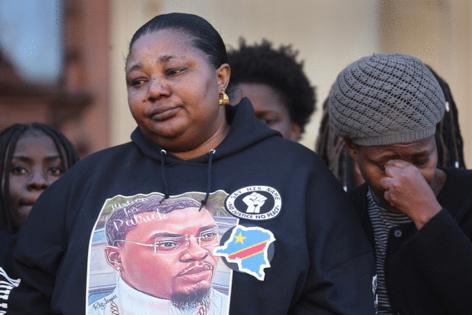Michigan Supreme Court declines appeal of Grand Rapids cop who killed Black man
Published in News & Features
DETROIT — The Michigan Supreme Court on Monday declined to hear an appeal filed by a former Grand Rapids police officer, who is now set to stand trial on a murder charge in the killing of Congolese immigrant Patrick Lyoya during a traffic stop.
Former Officer Christopher Schurr is charged with second-degree murder in connection with the 2022 fatal shooting of Lyoya, 26, after a traffic stop. Schurr, who is White, was bound over to stand trial in Kent County Circuit Court in October 2022 and appealed the district court's decision to do so.
The Court of Appeals ruled 2-1 in January that prosecutors have enough evidence for the case to stand trial, and Schurr appealed that ruling to the Michigan Supreme Court.
The Supreme Court justices said they weren't persuaded that the questions Schurr raised should be reviewed by the court.
Republican-nominated justices Brian Zahra and David Viviano said they would send the case back to the state Court of Appeals to decide an issue raised by Court of Appeals Judge Brock Swartzle, who dissented in the panel's 2-1 decision, on whether the Taser that Schur attempted to use on Lyoya counted as a dangerous weapon. But the majority of justices didn't sign on to that request.
Body camera video from April 2022 appears to show Lyoya trying to take Schurr's Taser as they wrestled on the ground. Schurr is heard shouting "let go of the Taser" before shooting and killing Lyoya.
"Although I agree with much of the majority opinion, I ultimately cannot agree with the majority’s conclusion that we should affirm the finding of probable cause," Swartzle wrote in his dissent. "Instead, I would vacate the district court’s finding and remand for that court to reevaluate the evidence under an updated understanding of the law, including that the decedent possessed a 'per se' dangerous weapon."
Matt Borgula, Schurr's attorney, argued in September 2023 at oral arguments before the Court of Appeals panel of judges that his client was protected by the Fleeing Felon Rule, which permits police to use deadly force on someone believed to have committed a felony and is fleeing. Lyoya had committed several felonies before he was shot, including resisting and obstructing an officer, disarming a police officer, and larceny, Borgula said.
Kent County Assistant Prosecutor Katie Wendt expressed concern during oral arguments with Borgula's characterization of the fleeing felon rule and said there needed to be parameters put on it, otherwise officers could use deadly force against anyone who used force against them. In this case, Wendt said, it would have meant Schurr could have shot Lyoya as soon as he started running away.
"I can't imagine any court would say an officer can shoot someone just for disobeying a command," Wendt said. "There have to be parameters to safeguard human life here."
During the traffic stop, Schurr asked Lyoya for his license and asked if he spoke English. Lyoya answered he did speak English and questioned why Schurr needed his license. Schurr told Lyoya his car wasn't registered. Lyoya later got out of his car and ran away as Schurr chased him. The two wrestled and struggled over Schurr's Taser before Schurr shot Lyoya in the back of the head as he was face down on the ground.
The city of Grand Rapids fired Schurr in June 2022 and Schurr didn't contest it.
A month later, the state of Michigan filed discrimination charges against the Grand Rapids Police Department because of the Lyoya shooting and other cases, including one from 2017 when officers pointed their guns at a Black child.
_____
©2024 The Detroit News. Visit detroitnews.com. Distributed by Tribune Content Agency, LLC.










Comments